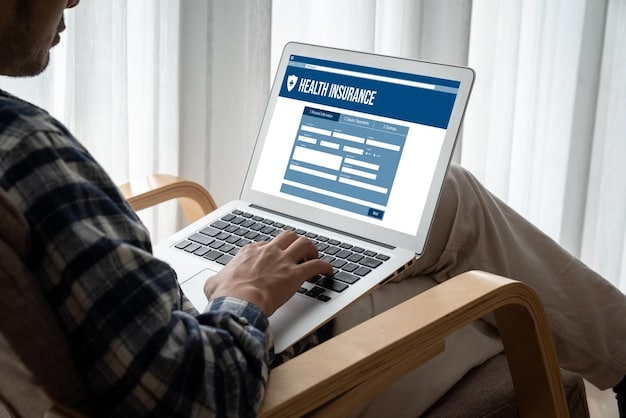Don’t Leave Money on the Table: Your Guide to Unclaimed Benefits

Don’t Leave Money on the Table: A Step-by-Step Guide to Unclaimed State Benefits provides you with the information and resources to discover and claim forgotten assets held by state governments, ensuring you receive what is rightfully yours.
Many individuals in the US are unaware that state governments hold billions of dollars in unclaimed funds. This comprehensive guide, Don’t Leave Money on the Table: A Step-by-Step Guide to Unclaimed State Benefits, will show you how to find and recover what’s rightfully yours.
Understanding Unclaimed Property
Unclaimed property, also known as abandoned property, refers to financial assets or tangible items that have been turned over to the state because the rightful owner has not claimed them. These assets can range from forgotten bank accounts to uncashed checks and even physical items like safe deposit box contents.
States hold these assets to protect them until the rightful owner comes forward to claim them. It’s a system designed to reunite people with their lost or forgotten belongings.
Common Types of Unclaimed Property
Several types of assets commonly end up as unclaimed property. Knowing these types can help you identify potential sources of unclaimed funds that might belong to you or your family.
- Bank Accounts: Checking and savings accounts that have been inactive for a certain period (usually several years).
- Uncashed Checks: Payroll checks, refund checks, insurance payments, and other types of checks that were never cashed.
- Stocks and Bonds: Shares of stock or bonds where the owner cannot be located.
- Insurance Policies: Life insurance payouts or annuity contracts where the beneficiary cannot be found.

The specific types of property held by each state can vary, so it’s important to check with the relevant state’s unclaimed property office.
Understanding the different types of unclaimed property is the first step in reclaiming what’s yours. The next step is to learn how to search for it.
Step-by-Step Guide to Searching for Unclaimed Property
Searching for unclaimed property is a straightforward process, but it requires patience and attention to detail. By following these steps, you can increase your chances of finding potentially forgotten assets.
The core of the search involves checking state unclaimed property databases, which are typically free to use and accessible online.
1. Identify States Where You’ve Lived or Done Business
Start by making a list of all the states where you’ve lived, worked, or conducted business. Unclaimed property is typically held by the state where the last known address of the owner was located.
2. Use Official State Unclaimed Property Websites
Each state has an official unclaimed property website where you can search for your name or the name of your family members. Be sure to use the official state websites to avoid scams and fraudulent schemes.
- National Association of Unclaimed Property Administrators (NAUPA): This organization provides links to official unclaimed property websites for each state.
- MissingMoney.com: This is a multi-state website endorsed by NAUPA that allows you to search multiple states at once.
- Individual State Websites: You can find each state’s website by searching online for “[State Name] Unclaimed Property.”
Always use the official state websites or NAUPA endorsed website to ensure your search is secure and accurate.
By systematically searching through these resources, you can uncover potential unclaimed property that belongs to you.

Claiming Your Unclaimed Property
Once you’ve identified unclaimed property that belongs to you, the next step is to initiate the claim process. This process involves providing documentation to verify your identity and your right to claim the property.
Each state has its own specific procedures and requirements for claiming unclaimed property, so it’s important to follow the instructions provided by the state’s unclaimed property office.
Required Documentation
Typically, you’ll need to provide documentation to prove your identity and your connection to the unclaimed property. Common documents include:
- Proof of Identity: A copy of your driver’s license, passport, or other government-issued ID.
- Proof of Address: A utility bill, bank statement, or other document that shows your current address.
- Proof of Ownership: Documents that connect you to the unclaimed property, such as bank statements, stock certificates, or insurance policies.
Submitting Your Claim
Once you’ve gathered the necessary documentation, you can submit your claim to the state’s unclaimed property office. Most states allow you to submit claims online or through the mail.
Follow the specific instructions provided by the state to ensure your claim is processed correctly. Be prepared to provide additional information or documentation if requested.
The claiming process may take several weeks or months, so be patient and follow up with the state’s unclaimed property office if necessary. Once your claim is approved, the state will return the unclaimed property to you, often in the form of a check.
Avoiding Unclaimed Property Scams
Unfortunately, unclaimed property scams are common. Scammers often attempt to trick individuals into paying fees to claim property that is rightfully theirs, or they may try to steal personal information.
It’s important to be aware of these scams and to take steps to protect yourself. Remember, state governments do not charge fees to search for or claim unclaimed property.
Red Flags of Unclaimed Property Scams
Be cautious of anyone who asks you to pay a fee to claim unclaimed property. Other red flags include:
- High-Pressure Tactics: Scammers may pressure you to act quickly or face losing your claim.
- Requests for Personal Information: Be wary of anyone asking for your Social Security number, bank account information, or other sensitive personal details.
- Unsolicited Contact: If you receive an unsolicited call, email, or letter about unclaimed property, be skeptical.
Protecting Yourself from Scams
To protect yourself from unclaimed property scams, follow these tips:
Always use official state unclaimed property websites or NAUPA endorsed websites.
Never pay a fee to claim unclaimed property.
Be wary of unsolicited contact about unclaimed property.
By staying informed and cautious, you can ensure that you don’t fall victim to an unclaimed property scam.
The Role of Heirs and Estates in Unclaimed Property
Unclaimed property doesn’t just belong to living individuals. It can also be claimed by heirs and estates. If a deceased family member had unclaimed property, you may be able to claim it as the rightful heir or executor of their estate.
The process of claiming unclaimed property for an estate can be more complex than claiming it for yourself, as it requires additional documentation to prove your legal right to act on behalf of the estate.
Required Documentation for Estates
In addition to the standard documentation required for claiming unclaimed property, heirs and executors will typically need to provide:
- Death Certificate: A copy of the deceased person’s death certificate.
- Will or Probate Documents: Documents that establish your legal right to act on behalf of the estate, such as a will or letters of administration.
- Proof of Relationship: Documents that prove your relationship to the deceased person, such as birth certificates or marriage certificates.
Navigating the process of claiming unclaimed property for an estate can be challenging, so it’s often helpful to seek legal advice from an attorney specializing in estate administration.
Locating Unclaimed Property for Deceased Relatives
Begin by gathering information about the deceased relative’s past residences, bank accounts, and other potential sources of funds. Search the official unclaimed property databases in the states where they lived.
By systematically searching for unclaimed property and preparing the necessary documentation, you can ensure that your family receives what it’s rightfully owed.
Additional Resources for Finding Unclaimed Property
While state unclaimed property offices are the primary resource for finding unclaimed property, several other resources can help you in your search.
These resources include federal agencies, private databases, and professional tracing services.
Federal Agencies
Certain federal agencies also hold unclaimed funds, such as:
- Internal Revenue Service (IRS): The IRS may hold unclaimed tax refunds.
- U.S. Department of the Treasury: The Treasury may hold unclaimed savings bonds or other government securities.
Professional Tracing Services
If you’re having difficulty locating unclaimed property on your own, you may consider hiring a professional tracing service. These services specialize in locating unclaimed assets and can handle the claim process on your behalf.
Professional tracing services typically charge a fee or take a percentage of the recovered funds. Be sure to research any tracing service carefully and check their credentials before hiring them.
By utilizing these additional resources, you can ensure that you leave no stone unturned in your search for unclaimed property.
| Key Point | Brief Description |
|---|---|
| 💰 Search State Databases | Use official state sites to search for unclaimed funds under your name. |
| 📑 Gather Documentation | Collect IDs, proof of address, and ownership documents for claim submission. |
| 🛡️ Avoid Scams | Be cautious of requests for fees or sensitive personal information. |
| 👨👩👧👦 Check for Heirs | Determine whether you are in line for an Estate/Inheritance claim. |
Frequently Asked Questions
▼
Unclaimed money can include forgotten bank accounts, uncashed checks, stocks, bonds, insurance policies, and even contents from safe deposit boxes. Each state holds these assets until claimed.
▼
Begin by identifying states where you’ve lived or worked. Then, use official state unclaimed property websites, like those linked on NAUPA’s site, to search under your name.
▼
Typically, you’ll need proof of identity (like a driver’s license), proof of address (like a utility bill), and any documents that connect you to the unclaimed property, such as bank statements.
▼
Be cautious of anyone asking for fees to claim unclaimed property. State governments do not charge fees. Also, protect your personal information and avoid unsolicited contact about potential claims.
▼
Yes, heirs and executors of estates can claim unclaimed property. You’ll need to provide additional documentation, such as a death certificate, will, or probate documents, to prove your legal right.
Conclusion
Reclaiming unclaimed property is a worthwhile endeavor that can put forgotten funds back in your pocket. By following this step-by-step guide and utilizing the available resources, you can navigate the process with confidence and don’t leave money on the table. Stay vigilant, avoid scams, and ensure that you receive what is rightfully yours.





